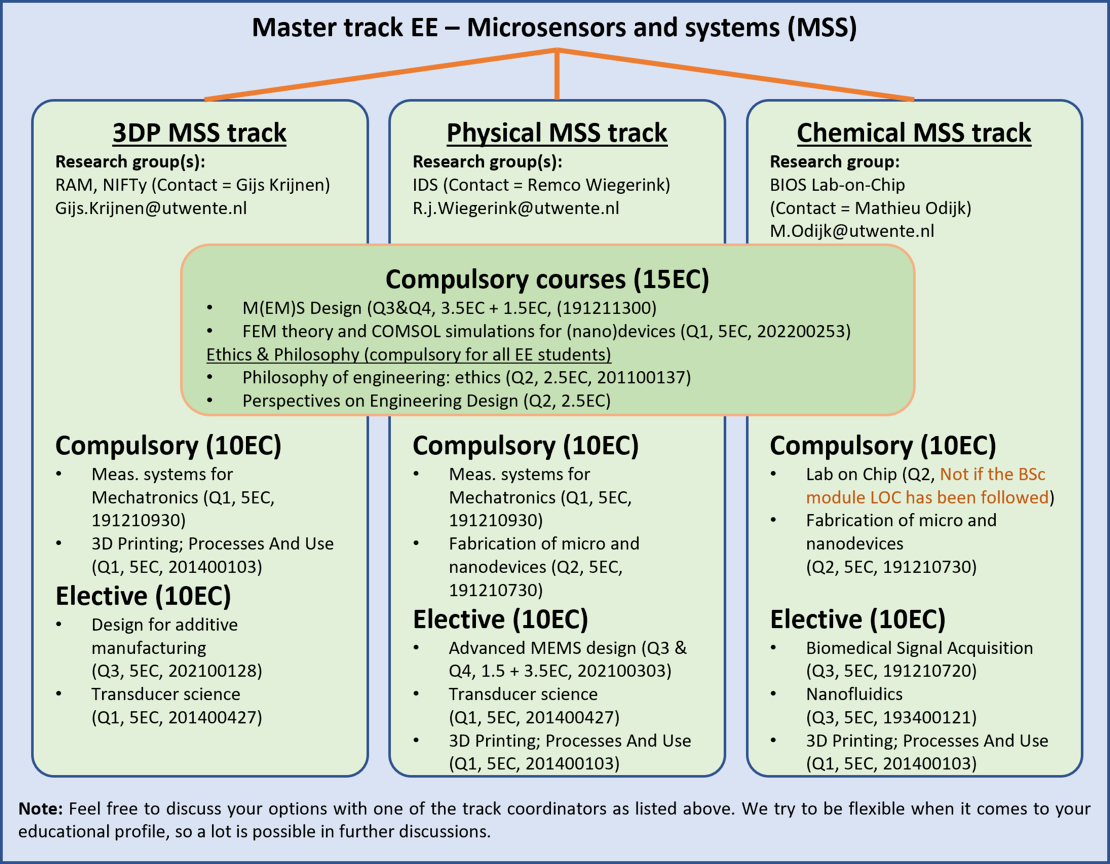IMPORTANT NOTICE
From September 2023, the specialization of Micro Sensors and Systems (MSS) has been divided into 3 profiles: 3D Printing MSS, Physical MSS and Chemical MSS.
EE-MSS master students enrolled before September 2023 can still continue their original study and can read the information below as a reference for selecting courses.
Introduction
Modern control and diagnostic systems rely heavily on data acquisition through sensors. Most often applications require small foot-print, small volume sensors, e.g. in complex machines like cars or in a medical context, next to good performance. Progress in sensors and sensors technology is largely found at the cross-section of materials, (new) fabrication methods, device physics and electronic interfacing. Developments like Industry 4.0 and the Internet of Things (IoT) call for ever increasing numbers of increasingly more varied sensors in further shrinking volumes. Miniaturisation and embedding of sensors help in realising these new developments. Besides their small size, a fascinating aspect of such sensors is that multiple subfields of physics, chemistry and electrical engineering come together when we want to make and understand such sensor systems.
The research on micro sensors and systems spans from materials via process integration and device physics to device reliability; you can usually find us in or around Nanolab or the 3D print lab at the RAM group. Examples are: ultra-low-noise accelerometers for noise reduction in the detection of gravitation waves, microfluidic measurement systems for medical drug delivery, and custom designed and fabricated force sensors for use in knee prothesis operations.
The Micro Sensors and Systems track is directly linked with the research groups Integrated Devices and Systems (Wiegerink, IDS), the BIOS Lab-on-Chip group (Odijk, BIOS), and the Transducers research theme (Krijnen, RAM), and the research institute MESA+.
Programme mentor - 3D Printing MSS
Programme mentor - Physical MSS
Programme mentor - Chemical MSS
Overview of course packages for 3D Printing MSS, Physical MSS and Chemical MSS

Compulsory courses
The following courses are compulsory for all students in the specialisation:
Code | Course | Study load (EC) | Quarter |
FEM theory and COMSOL simulations for (nano)devices | 5 | 1A | |
Perspectives on Engineering Design | 2,5 | 1B | |
Philosophy of Engineering: Ethics | 2,5 | 1B | |
Micro Electro Mechanical Systems Design | 5 | 2A |
Two additional compulsory courses for 10EC will be chosen according the profile that students follow.
Profile of 3D printing MSS:
Code | Course | Study load (EC) | Quarter |
Measurement Systems for Mechatronics | 5 | 1A | |
3D Printing; Processes And Use | 5 | 1A |
Profile of Physical MSS:
Code | Course | Study load (EC) | Quarter |
Measurement Systems for Mechatronics | 5 | 1A | |
Fabrication of micro and nanodevices | 5 | 1B |
Profile of Chemical MSS:
Code | Course | Study load (EC) | Quarter |
Lab on a Chip (Not if the bachelor module of LOC has been followed.) | 5 | 2A | |
Fabrication of micro and nanodevices | 5 | 1B |
Website for more information
3D printing MSS: Robotics and Mechatronics (utwente.nl)
Physical MSS: IDS | Integrated Devices and Systems | University of Twente (utwente.nl)
Chemical MSS: BIOS | The BIOS Lab-on-a-chip group (utwente.nl)
